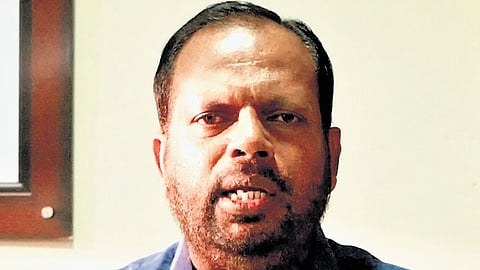INTERVIEW| Waqf Board registered Munambam property without hearing anyone: K N Unnikrishnan MLA
KOCHI: As many as 610 families, mostly poor fisherfolk, in Munambam are locked in a life and death battle after the Waqf Board claimed right on over 404 acres of land that they called home for decades. In an interaction with TNIE, K N Unnikrishnan, the CPM MLA from Vypeen, under which Munambam falls, says a major drawback in the Waqf Act is that it gives Waqf Board unlimited power to voluntarily claim right to a land.
What is the background of the Munambam issue?
As per records, the King of Travancore leased 404 acres of land and 60 acres of water, known as Munambam property, to Abdul Sattar Musa Haji Seth in 1902. In 1948, Haji transferred the property to his successor Mohammed Siddique Sait. On November 1, 1950, Sait handed over the land to the Farooq College management, as ‘Waqf’, as per the title deed. In 1960, the college received its ‘Thandaper Pattayam’. In 1967 and 1975, the residents moved Paravur court. At the same time, those staying at the property for over 25 years got the land with proper documents. So, since 1989, several sales deeds have been done on the property. Between 1989 and 2001, as per 381 deeds in Kuzhupilly and Pallippuram villages, 14,771.58 cents were transacted through the sales deeds.
What happened then?
In 2019, the Waqf Board voluntarily identified the Munambam area as ‘Waqf land’ in its register.
Why was the Nissar Commission appointed?
Back then, land identified as Waqf properties were getting lost to encroachments or by other means. There were demands the land be returned to the Waqf. It was in this context the Nissar Commission was appointed by the V S Achuthanandan government in 2008.
Did the government approve the report?
The commission submitted its report in 2009, the government approved it, and also brought out two orders.
Is Munambam area Waqf property as per the report?
The commission did not declare it Waqf property, but remarked it could be claimed as ‘Waqf land’. Based on this, the Board staked its claim unilaterally. Waqf defenders say if a person gives a property as ‘Waqf’, it should be registered with the Board. The Waqf Act has such a clause. So, the Farooq College management is legally bound to register the property with the Waqf Board. This was not done. Though the college did not register it, the Waqf Board, in 2019, registered the Munambam area as without hearing anyone.
Was it the right thing to do?
If you ask me, that is the drawback of the Waqf Law. People are questioning this provision. This overwhelming power was incorporated into the Waqf Act when the Congress-led government was ruling the country.
Why did land tax collection from residents stop?
When the Waqf Board approached the government in 2022 saying it has right on the land and property tax should not be accepted, the revenue department stopped accepting it from Munambam residents. As a result, they could not avail funds. As a newly elected MLA, I took up the matter before the revenue minister and others. The minister held discussions with the Waqf minister. Talks were held with the CM too, and it was decided that the question of the title deed can be resolved later, and the residents be allowed to pay tax.
What happened then?
Two persons, Nassir Manayil and T M Abdul Salam, who have no links to the Waqf Board, moved the HC, saying the government move aimed to allow private parties to undertake transactions clandestinely at Munambam. The case is sub-judice and hence, since 2022, people have not been allowed to pay land tax.
Who is the duo?
A proper enquiry is needed against them, what their interests and ultimate aim are. Munambam was a land of communal harmony. A move has been taken to divide people on communal lines and turn them against the Left government.

